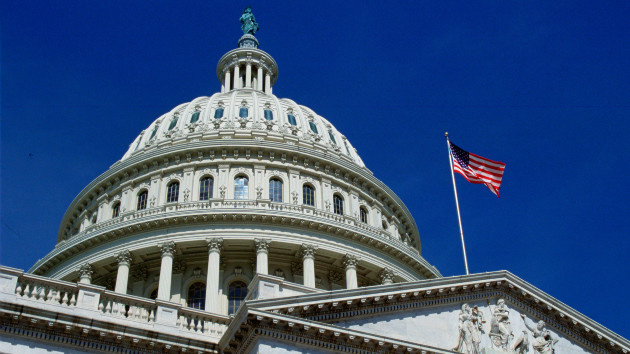(WASHINGTON) — A coalition of nearly two-dozen progressive groups on Monday launched a seven-figure effort to defend progressive Democrats in Congress who have criticized both Israel’s military offensive in Gaza and continued U.S. support for Israel — marking a major new development in the intraparty battle over support for Israel in the Democratic Party.
The “Reject AIPAC” bloc, which includes Justice Democrats, Our Revolution, the Sunrise Movement and the IfNotNow Movement, plans to rally voters as part of a “electoral defense campaign” to support Democrats who have been criticized by the pro-Israel American Israel Public Affairs Committee.
The coalition will also organize demonstrations calling for a cease-fire in Gaza and for lawmakers to impose new conditions on U.S. military support for Israel as Israel targets Hamas fighters — while encouraging lawmakers to sign a pledge to not take campaign contributions from AIPAC.
The latter group has deep ties in Washington, across both sides of the aisle, and regularly endorses both pro-Israel Republicans and Democrats every election cycle.
United Democracy Project, the organization’s super PAC, has received millions of dollars from Democratic megadonors, such as Haim Saban, as well as Republicans donors including hedge fund billionaire Paul Singer and Home Depot founder Bernie Marcus, according to Open Secrets.
In a statement to ABC News, the anti-AIPAC coalition accused AIPAC of working to “silence growing dissent in Congress” over Israel’s war against Hamas in Gaza, “even as Democratic voters overwhelmingly support a ceasefire and oppose sending more blank checks to the Israeli military.”
Already, AIPAC has endorsed Missouri Democratic candidate Wesley Bell and New York Democratic candidate George Latimer, who have launched primary campaigns against progressive “Squad” member Reps. Cori Bush, of Missouri, and New York’s Jamaal Bowman, who have been vocal in pushing back on Israel’s campaign in Gaza.
The group spent tens of millions of dollars in Democratic primaries in the 2022 midterm elections and supported the successful campaign of Rep. Haley Stevens, D-Mich., when she faced fellow Democratic Rep. Andy Levin, a progressive who had voiced criticism of Israel.
AIPAC, and Democratic Majority for Israel, another pro-Israel super PAC, have been among the most prolific outside spending groups in recent election cycles.
United Democracy Project (UPD) has already raised $45 million so far this election cycle, more than $26 million of that pouring in after October, disclosure filings show. That’s a big jump from what the group raised during the last election cycle, when they brought in just under $35 million throughout the two-year period.
The Democratic Majority for Israel (DMFI)’s super PAC reported raising a relatively smaller $3.5 million so far this cycle.
Both groups have devoted much of their resources to a House race in California’s 47th District, with UPD spending more than $4.6 million unsuccessfully opposing Democratic California state Sen. Dave Min, who will be facing Republican counterpart Scott Baugh, and DMFI’s political action committee similarly spending hundreds of thousands of dollars opposing Min and supporting his Democratic primary rival.
AIPAC has been clear that it makes political decisions on one criteria: “commitment to strengthening the US-Israel relationship,” a spokesperson told Politico earlier this month.
“We support scores of progressive candidates including the Democratic leadership and nearly half of the membership of the congressional Progressive Caucus, Black Caucus and Hispanic Caucus,” the spokesperson said then.
According to a February poll from Quinnipiac University, 48% of registered voters slightly oppose sending more military aid to Israel, while 44% approve.
Roughly 53% of Democrats oppose sending more aid to Israel, while 38 approve of it. Among independents, 55% oppose more aid and 38 approve; roughly 63% of Republican responded supported more aid, and 32 percent opposed it, according to the poll.
More than 30,000 people have been killed in Gaza the last five months of the conflict between Israel and Hamas, which was sparked by Hamas’ Oct. 7 terror attack, according to the Hamas-controlled health ministry.
Hundreds of thousands of Gazans in the territory are on the brink of famine, the U.N. has said.
Israeli officials insist the military takes steps to curb civilian casualties, despite the death toll, and they deny accusations that Israel isn’t letting enough aid into Gaza, blaming U.N. and its partner agencies for creating logistical challenges — which the organization disputes.
ABC News’ Soo Rin Kim contributed to this report.
Copyright © 2024, ABC Audio. All rights reserved.












